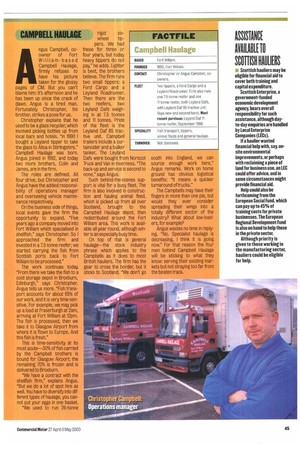CAMPBELL HAULAGE
Page 47

If you've noticed an error in this article please click here to report it so we can fix it.
Angus Campbell, coowner of Fort William-based Campbell Haulage, firmly refuses to have his picture taken for the glossy pages of CM. But you can't blame him: it's afternoon and he has been up since the crack of dawn. Angus is a tired man. Fortunately Christopher, his brother, strikes a pose for us.
Christopher explains that he used to be a glass recycler, which involved picking bottles up from local bars and hotels. "In 1990 I bought a Leyland tipper to take the glass to Alloa in Stirlingshire." Campbell Haulage was born. Angus joined in 1992, and today two more brothers, Colin and James, are in the firm.
The roles are defined. All four drive, but Christopher and Angus have the added responsibility of operations manager and overseeing vehicle maintenance respectively.
On the business side of things, local events gave the firm the opportunity to expand. "Five years ago a company moved into Fort William which specialised in shellfish," says Christopher. So I approached the firm and invested in a 7.5-tonne reefer; we started carrying the fish from Scottish ports back to Fort William to be processed."
The work continues today. "From there we take the fish to a cold storage depot in Broxburn, Edinburgh," says Christopher. Angus tells us more. "Fish transport accounts for about 65% of our work, and it is very time-sensitive. For example, we may pick up a load at Fraserburgh at 2am, arriving at Fort William at 12pm. The fish is processed, then we take it to Glasgow Airport from where it is flown to Europe. And this fish is fresh."
This is time-sensitivity at its most acute-30% of fish carried by the Campbell brothers is bound for Glasgow Airport; the remaining 70% is frozen and is delivered to Broxburn.
"We have a contract with the shellfish firm," explains Angus. "But we do a lot of spot hire as well. You have to diversify into different types of haulage, you cannot put your eggs in one basket "We used to run 26-tonne rigid six wheel tip
BASED FOUNDED CONTACT FLEET SPECIALITY TURNOVER:
pers. We had these for three or four years, but today heavy tippers do not pay," he adds. Lighter is best, the brothers believe. The firm runs two small tippers: a Ford Cargo and a Leyland Roadrunner. Then there are the two reefers, two Leyland Dafs weighing in at 7.5 tonnes and 11 tonnes. Pride of the fleet is the Leyland Oaf 85 tractive unit. Campbell trailers include a curtainsider and a bulker tanker. The Leyland Dafs were bought from Norscot Truck and Van in Inverness. "The back-up and service is second to none," says Angus.
Such behind-the-scenes support is vital for a busy fleet. The firm is also involved in construction and hauling animal feed, which is picked up from all over Scotland, brought to the Campbell Haulage depot, then redistributed around the Fort William area. This work is available all year round, although winter is an especially busy time.
On top of that is general haulage—the stock industry phrase which applies to the Campbells as it does to most British hauliers. The firm has the gear to cross the border, but it sticks to Scotland. "We don't go south into England, we can source enough work here," Angus remarks. Work on home ground has obvious logistical benefits: "It means a quicker turnaround of trucks."
The Campbells may have their fingers in more than one pie, but would they ever consider spreading their wings into a totally different sector of the industry? What about low-loaders, for example?
Angus wastes no time in replying. "No. Specialist haulage is decreasing, I think it is going now." For that reason the four men behind Campbell Haulage will be sticking to what they know: serving their existing markets but not straying too far from the beaten track.








































































































